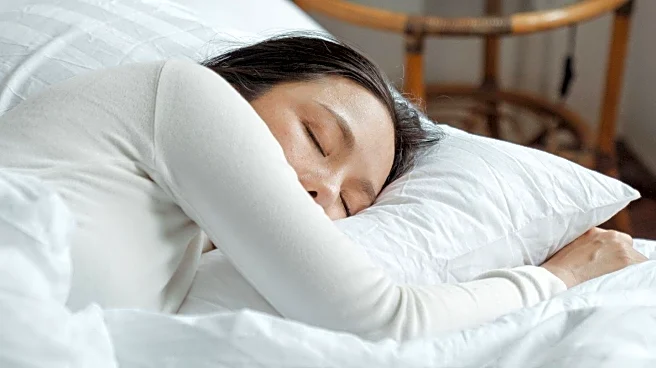What's Happening?
Recent insights from sleep experts challenge the traditional notion that eight hours of sleep is universally necessary for optimal health. According to Wendy Troxel, PhD, a senior behavioral and social scientist with RAND, sleep needs can vary significantly among individuals, with some requiring more or less than the standard seven to nine hours. The emphasis is shifting towards the quality and regularity of sleep rather than just the duration. A study published in Sleep highlights that maintaining consistent sleep patterns, such as regular bed and wake-up times, is associated with a 48% lower risk of death from any cause compared to erratic sleep schedules. This suggests that consistency in sleep habits may be a stronger predictor of longevity than the total hours of sleep.
Why It's Important?
This shift in understanding about sleep has significant implications for public health and personal well-being. By focusing on sleep regularity, individuals may improve their overall health outcomes and potentially increase their lifespan. This new perspective encourages people to tailor their sleep habits to their personal needs rather than adhering to a one-size-fits-all approach. It also underscores the importance of sleep hygiene and the potential benefits of cognitive behavioral therapy for insomnia (CBT-I) for those with chronic sleep issues. The findings could influence healthcare recommendations and lead to more personalized sleep advice, benefiting those who struggle with sleep disorders or irregular sleep patterns.
What's Next?
As these insights gain traction, healthcare providers may begin to incorporate more personalized sleep assessments and recommendations into their practice. This could involve advising patients on maintaining consistent sleep schedules and exploring treatments like CBT-I for those with persistent sleep difficulties. Additionally, public health campaigns might shift focus from promoting a specific number of sleep hours to encouraging regular sleep patterns. Further research could explore the long-term health impacts of sleep regularity and how it interacts with other lifestyle factors.
Beyond the Headlines
The evolving understanding of sleep highlights broader cultural and societal shifts towards personalized health and wellness strategies. As more people become aware of the importance of sleep regularity, there may be increased demand for flexible work schedules and environments that support healthy sleep habits. This could lead to changes in workplace policies and a greater emphasis on mental health and well-being in both personal and professional settings.












